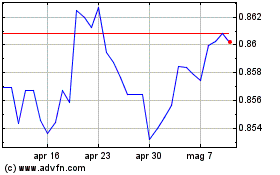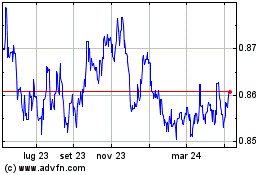Pound Falls On Brexit Uncertainty
08 Agosto 2017 - 9:44AM
RTTF2
The pound dropped against its major counterparts in European
deals on Tuesday amid uncertainty over ongoing Brexit talks, after
the UK government reportedly refused to accept GBP 36 billion
divorce bill to quit the European Union.
Downing Street dismissed weekend reports that Britain is
prepared to pay up to 40 billion to clinch a free trade deal with
the EU, as Tory MPs criticized the claim.
The Brexit negotiations have not started smooth from the British
side, the former head of the Foreign Office Simon Fraser told BBC
Radio 4 on Monday.
"We haven't put forward a lot because, as we know, there are
differences within the cabinet about the sort of Brexit that we are
heading for and until those differences are further resolved I
think it's very difficult for us to have a clear position," Fraser
said.
Meanwhile, Wokingham MP John Redwood described The Sunday
Telegraph report as "completely ridiculous."
"We all know they will talk about trade before March 2019
because it's in their interest to do so. We have absolutely no need
to pay them a penny, to get them to talk about something they need
to talk about."
The pound traded mixed against its major rivals in the Asian
session. While the pound held steady against the yen and the euro,
it rose against the franc and the greenback.
The pound slipped to an 11-day low of 1.2652 against the franc,
from a high of 1.2700 hit at 10:00 pm ET. The next possible support
for the pound is seen around the 1.24 region.
Data from the State Secretariat for Economic Affairs showed that
Switzerland's unemployment rate remained stable in July.
The jobless rate held steady at seasonally adjusted 3.2 percent
in July. On an unadjusted basis, the unemployment rate was 3
percent, the same as in June.
The pound fell to 143.65 against the Japanese yen, a level
unseen since June 28. Continuation of the pound's downtrend may see
it challenging support around the 142.00 level.
Survey figures from the Cabinet Office showed that a measure of
peoples' assessment of the Japanese economy decreased unexpectedly
in July.
The current index of Economy Watchers' survey dropped to 49.7 in
July from 50.0 in June, which was the highest score since December
2015.
The pound that closed Monday's deals at 0.9050 against the euro
dropped to near a 1-year low of 0.9075. On the downside, 0.92 is
likely seen as the next support level for the pound.
Data from Destatis showed that Germany's trade surplus increased
in June as the decline in imports was larger than the fall in
exports.
Exports declined 2.8 percent in June from May, when they climbed
1.5 percent. Likewise, imports slid 4.5 percent, in contrast to
May's 1.3 percent increase.
Reversing from an early high of 1.3054 against the dollar, the
pound edged down to 1.3019. The pound may locate support around the
1.27 area.
Looking ahead, U.S. NFIB small business index and Canada housing
starts data, both for July, are due to be released in the New York
session.
Grafico Cross Euro vs Sterling (FX:EURGBP)
Da Mar 2024 a Apr 2024

Grafico Cross Euro vs Sterling (FX:EURGBP)
Da Apr 2023 a Apr 2024
